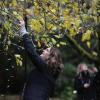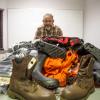August 10, 2006 - 5:00pm
For 70 years, students have come to <?xml:namespace prefix = st1 ns = "urn:schemas-microsoft-com:office:smarttags" />Nanaimo for a working education. <?xml:namespace prefix = o ns = "urn:schemas-microsoft-com:office:office" />
This fall is no different, with more than 500 students enrolled in Trades and Applied Technology courses at Malaspina University-College. Here they get a practical, hands-on, nuts and bolts education that gives them the skill to keep power in our engines, roofs over our heads, warmth in our buildings, food on our tables, and data in our computers.
They also learn to cope with continual change. In the 70 years since the first class of students signed up to learn carpentry and mechanics at the new Dominion Provincial Vocational Training School in Nanaimo, technology has transformed both trades and training.
“Technology in the trades changes rapidly, often from year-to-year, with mechanical programs like Automotive Service Technician seeing technology change at an even more rapid rate,” notes Dan Lines, Associate Dean, Trades and Applied Technology. He has first-hand experience of the changes, having trained as a heavy duty mechanic at Malaspina from 1971 to 1975.
By 1971, the Dominion Provincial Vocational Training School had been reincarnated twice. Founded in 1936, in 1958 it was renamed the B.C. Vocational School – Nanaimo. In 1971, the vocational school merged with two-year-old Malaspina College, creating an institution which offered both trades and academic training.
“We’re 70 years old but we’ve kept pace by working closely with industry,” Lines said. A Program Advisory Group from each industry ensures Malaspina’s courses are in sync with industry requirements. Frequent donations by private industry give students updated equipment and tools.
Students enrol for most programs between November and March, signing up almost a year in advance for courses which start the following September. Wait lists are not unusual.
“The demand for the majority of our programs is very strong,” Lines said. So is the demand for graduates. Companies seeking heavy-duty mechanics and heating-ventilating-air conditioning technicians have contacted Lines directly. Carpenters and welders are also in demand.
“The job market is like we’ve never seen it before,” Lines said. At one point employers were reluctant to take on apprentices – now they’re seeking them out.
Building trades are booming. Over the past few years, Malaspina has doubled the number of carpentry courses offered. In addition, the provincial Industry Training Authority has reduced Carpentry Entry-Level Trades Training by four months, in an effort to get carpenters into the workforce more quickly.
One of Malaspina’s most unusual trade courses was initiated by industry in order to stave off a projected worker shortage. The nine-month certification in Pulp and Paper Operations was developed at the direct request of the pulp and paper industry, which is facing an acute labour shortage as its workforce reaches retirement age.
All 15 graduates of the 2005 program were hired and employment prospects for students graduating in October are very good, Lines said. “Demand is still strong all over B.C.” This course starts again in January and is still accepting applications.
Administrative assistants are also in high demand, Lines said. Graduates of Malaspina’s Applied Business Technology program work as office assistants for accountants, lawyers, or as general office managers. A glance at local newspaper want ads demonstrates the demand for graduates able to manage offices, computer systems, and current software.
“If we look at what employers want, they need people who can work with technology,” Lines said. “They need people who are adaptable, who can learn, and who can continue to learn.”
The emphasis on mastering technology and lifelong learning belies the old-fashioned view of trades as non-intellectual. Lines notes carpenters and welders can shape wood and metal as creatively as sculptors shape clay or stone. Those who repair complex mechanical systems are often superb problem-solvers.
Some of these mechanical wizards thrive in the Inboard/Outboard Marine Technician and Outdoor Power Products program. Graduates have found work with existing engine or marine servicing businesses or have started their own businesses, meeting the demand for small engine repairs. Space in this program is still available. For information, see http://www.viu.ca/calendar/TradesAppliedTech/marinetech.asp.
Other programs currently accepting students are Culinary Arts (http://www.viu.ca/calendar/TradesAppliedTech/culinaryarts.asp), Hairdressing, (http://www.viu.ca/calendar/TradesAppliedTech/hairdressing.asp) and Barber/Stylist (http://www.viu.ca/calendar/TradesAppliedTech/barber.asp) .
To celebrate the 70th anniversary, Malaspina is planning several special events, starting with the hanging of celebratory banners throughout the campus.
“Our students could be entering a lifelong trade or discovering a stepping stone to something else,” Lines observed, citing his own experience. He earned his heavy duty mechanic ticket at 22, eventually become an instructor, and earned a Master’s Degree in Education at 46.
“You don’t know where you’re going to end up.”
Tags: In the Community






